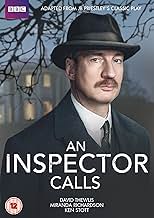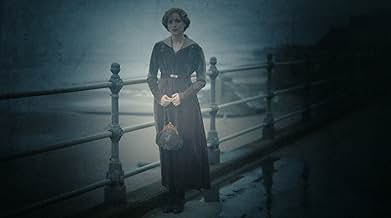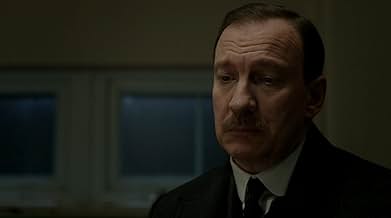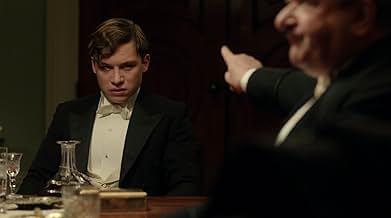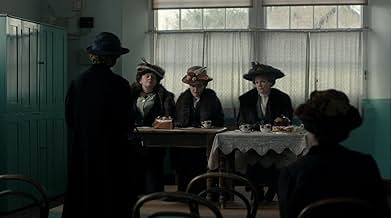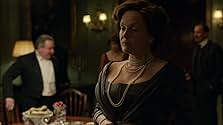Ajouter une intrigue dans votre langueA mysterious inspector investigates the wealthy Birling family and their dinner guest following the suicide of a young woman.A mysterious inspector investigates the wealthy Birling family and their dinner guest following the suicide of a young woman.A mysterious inspector investigates the wealthy Birling family and their dinner guest following the suicide of a young woman.
- Réalisation
- Scénario
- Casting principal
- Récompenses
- 2 victoires et 5 nominations au total
- Gate Keeper
- (non crédité)
- Posh Lady
- (non crédité)
- Millward's Shop Customer
- (non crédité)
- Young Eva
- (non crédité)
- …
- Factory Worker
- (non crédité)
- …
- seaside Photographer
- (non crédité)
- Factory Worker
- (non crédité)
Avis à la une
I can't compare (as yet) with the original version, but the 2015 version is very well, with good period atmosphere.
"An inspector calls" is based on the play of the same name by J.B. Priestley (1945). Earlier Priestleys novel "Benighted" (1927) had been adapted by James Whale into the movie "The old dark house" (1932). Both novel and play are comments on the English class society.
The story of "An inspector calls" is about the suicide of a working class girl. During an interrogation by the mysterious inspector Goole (being a group interrogation, this gives the play / film a very Agatha Christie like flavor) it turns out that all of the members of a wealthy family have contributed in one way or another to this suicide.
The story has aged very well. I would like to call attention to a couple of things in particular.
In the beginning of the film the father of the wealthy famlily says "It is not important where you start in life, it is important where you finish". The old American dream phrased differently. His own family is the living proof of the fact that it does matter where you start in life.
Inspector Goole is very mysterious. He seems to be omniscient, interrogating to force a confession and not to learn more himself. He makes a very moralistic farewell speech, in which he says there are thousands of people like the poor working class girl in the story. It is obvious that he is not an ordinary police inspector. It is for the spectator to decide who or what he really is.
The members of the family ar all guilty of the suicide of the girl. There guilt is however ethical and not legal. It is disenchanting to see how quickly some members of the family recuperate when they become aware of this distinction.
Eva Smith does not appear in the Priestley text; in this version she is transformed into a hard-working girl who is not backward about coming forward. Hence she becomes an object of affection for factory-owner Arthur Birling (Ken Stott), his son Eric (Finn Cole), and Gerald Croft (Kyle Soller), the son of a rival factory-owner who is due to be affianced to Arthur's daughter Sheila (Chloe Pirrie). Yet it soon becomes clear that all of them treat her as an object to be picked up and cast aside at will; it's a tribute to Eva's strength of character that she manages to sustain her integrity throughout, until she gives up the ghost and commits suicide.
At the end of the film the floorboards shot is explained, as Eva describes herself as "a crack in the floorboards" - a member of the underclass who is allowed to fall through in a crassly unequal society. No one, it seems, is willing to treat her on her own terms as a human being.
Walsh's version also represents the Inspector (David Thewlis) as a mysterious figure moving slowly in the darkness towards the Birling residence, walking along a narrow slum in shadow, his bowler hat and long coat silhouetted, and visiting the dying Eva in hospital. We are left unsure as to whether he exists at all - especially at the end when he mysteriously disappears. But the question of his being isn't really important: what matters more is his ability to uncover the truth about the Birling family through patient, insistent questioning. Thewlis's expression remains impassive throughout - even if he despises the Birlings' superciliousness, he will never let his emotions get the better of him.
In the central moments of the drama, as the truth about the family was gradually revealed, Walsh used repeated close-ups to focus on the protagonists' changing expressions: Arthur's look of quiet confidence was transformed into an expression of utter despair as he ran his hands through his hair; his wife Sheila (Miranda Richardson) tried her best to retain an impassive exterior, but the tell-tale movements of her cheek and neck-bones betrayed her emotions. Her stoicism in the face of the inevitable truth-revelation was contrasted with Eric's expressions - at first he looked guiltily at everyone in full knowledge that he had been in some way responsible for Eva's death, but as the drama unfolded he acquired a strength of character as he tried to come to terms with his past.
Brilliantly performed and suggestively directed; this was a thoroughly televisual version of the play that reminded us of the persistence of social inequalities today.
The play is opened up just enough so as you'd notice with some external scenes but mostly, as you'd expect it's played indoors, intensifying the drama to a backdrop of hypnotic chamber music as the plot edges inevitably to its climaxes. I say climaxes because of the two big reveals that Priestley employs, firstly exposing the hypocrisy of the staid pre-Great War English society in their links to this young woman's demise and then the brilliant twist at the end just when it seems as if they've all gotten away with it.
Some of Priestley's wider themes seem to be just that, i.e. wide of the mark, like his prediction of a bloody uprising by the downtrodden working classes, although considering the social upheaval later in the depicted decade, obviously with events abroad in Russia, Ireland and Weimar Germany to name but three, never mind the General Strike and Red Clydeside disputes of the post-War era here in Britain maybe he wasn't so far out either. It's only in the words and actions of the two youngest members of the afflicted Birlings that we see any hope of societal change in the future as we observe their conscience-stricken reaction to events, neither tainted by the jaundiced, self-motivated experience of their elders.
The treatment of the Inspector I thought played up the fantastic element just a little too much with the extended epilogue showing him as a sort of omnipresent spirit surrounding Eva as she comes to her fateful end almost as if the director felt the need to explain his unexplained presence,which for me reduced the character's effectiveness as the pricked conscience of the group, his last appearance should really have been after he finished with the family at the house.
Nevertheless, any production like this which respects the context of the original play as this one undoubtedly does, even if at times it creaked rather than crept along, still managed to entertain me just as it always has, as a taut, cleverly written, psychological thriller with a moral in the tale.
I must admit I had my doubts beforehand about this, I tend to think sometimes if it ain't broke don't fix it, I love both the 1954 and 1982 versions respectively. This though had me utterly engrossed, it was an outstanding version. It looked superb, the factory scenes looked incredibly authentic, as did the scenes in the house.
I liked how it began too, not straight into the dinner setting, we were given a little bit of background. From then on it kept to the story beautifully, it must have been tempting to have tweaked it in some way. Definitely the most serious version of it, no softer humorous side, this was pretty bleak. I couldn't pick a standout performance as I thought every cast member was wonderful.
Truly captivating, 10/10
Le saviez-vous
- AnecdotesThe original play was produced twice on Broadway over a 50-year period of time. The second production earned multiple awards, including Best Revival of a play, and best featured actress for Jane Adams. The revival production also earned awards for creative set design, which featured all adult actors moving around on an oversized doll house sized set, and the actors were unable to actually enter or move around within the rooms of the house.
- GaffesGerald leaves the room after Sheila has given him back her engagement ring, but the next time she appears, she still has the engagement ring on her finger.
- Citations
The Inspector: There are millions and millions of Eva Smiths and John Smiths still left with us, with their lives, their hopes and fears, their suffering and chance of happiness, all intertwined with our lives in what we think and say and do. We don't live alone upon this earth. We are members of one body. We are responsible for each other. And if mankind will not learn that lesson, then the time will, soon, when he will be taught it in fire and blood and anguish.
- ConnexionsRemake of Un inspecteur vous demande (1954)

